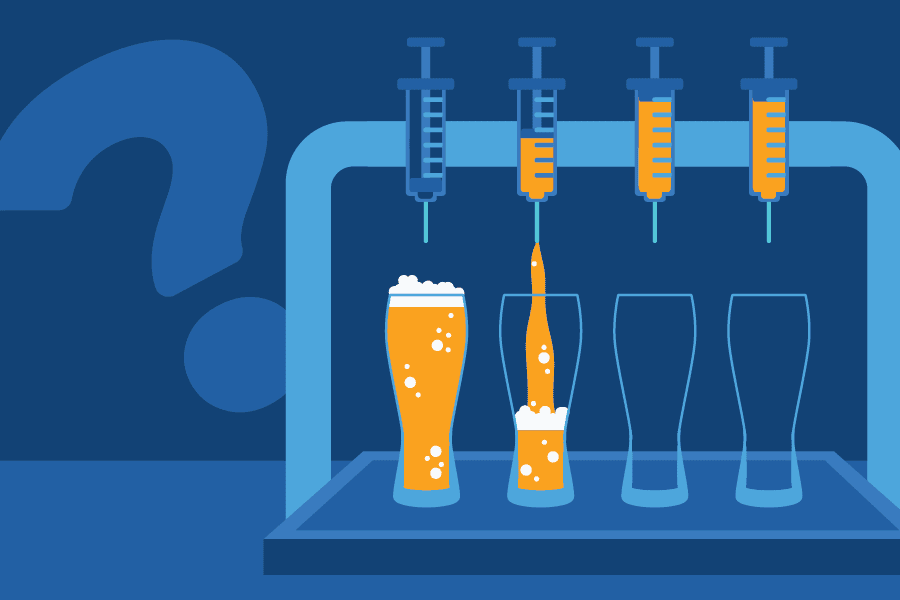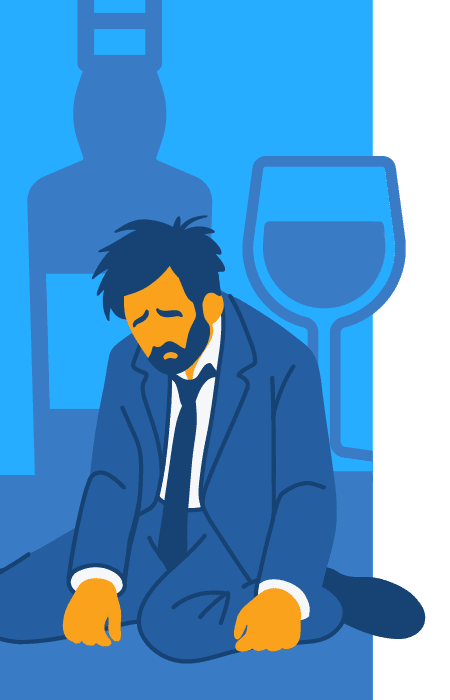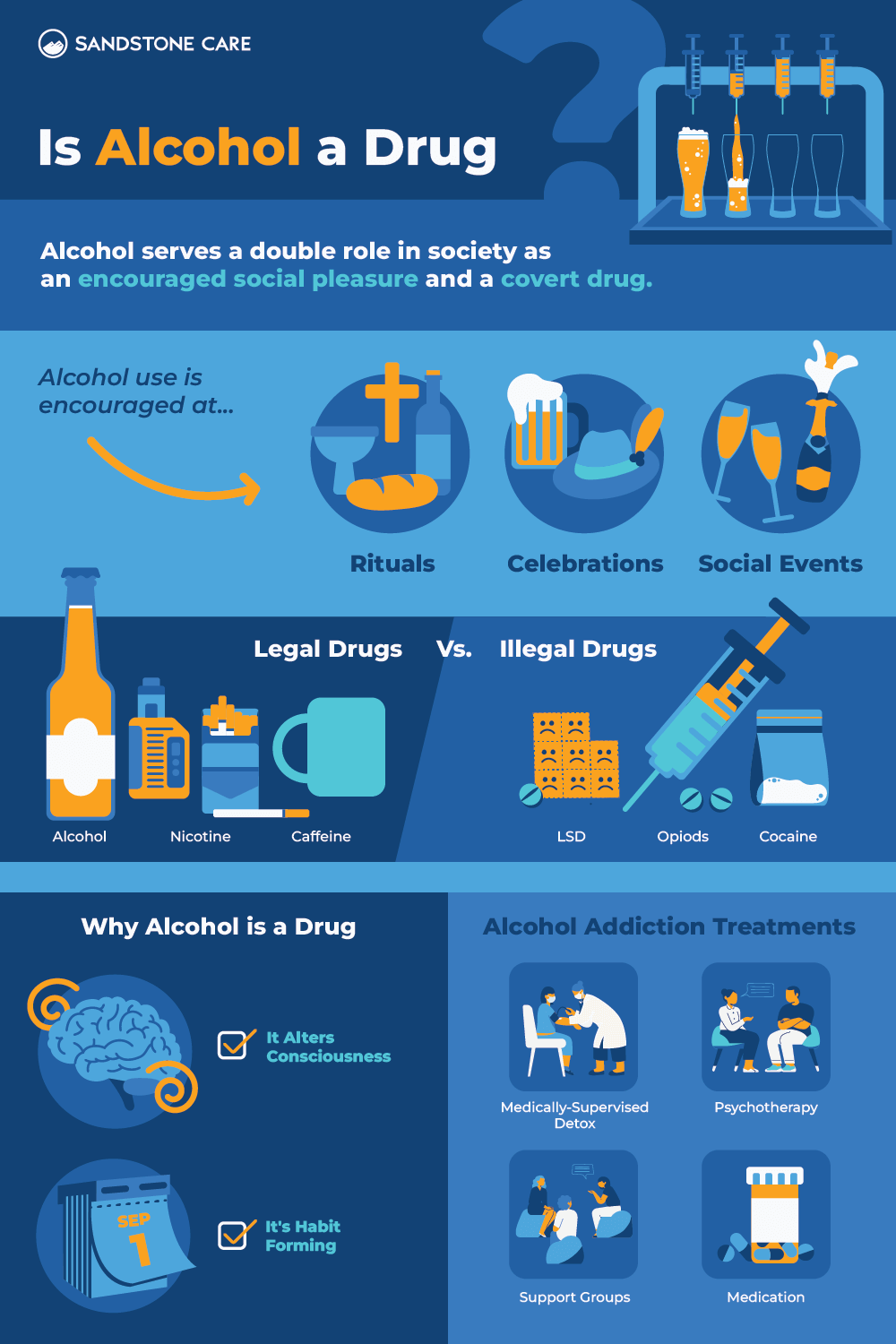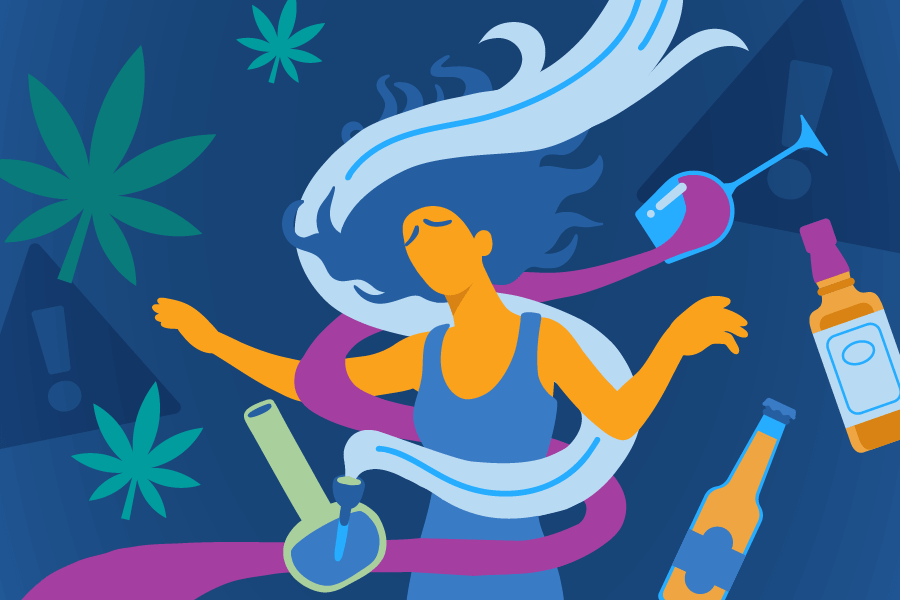History of Alcohol
Alcohol use can date back to 7000 BC.
Alcohol is believed to be a significant part of social development, being used as a nutritious source of calories in earlier ages, and even suggested to have come before the invention of bread.
Around the world, alcohol is consumed by many different types of people, and in many cultures, alcohol use is normalized and accepted.
However, the everyday use of alcohol brings up the conversation on the risks and effects that may come along.
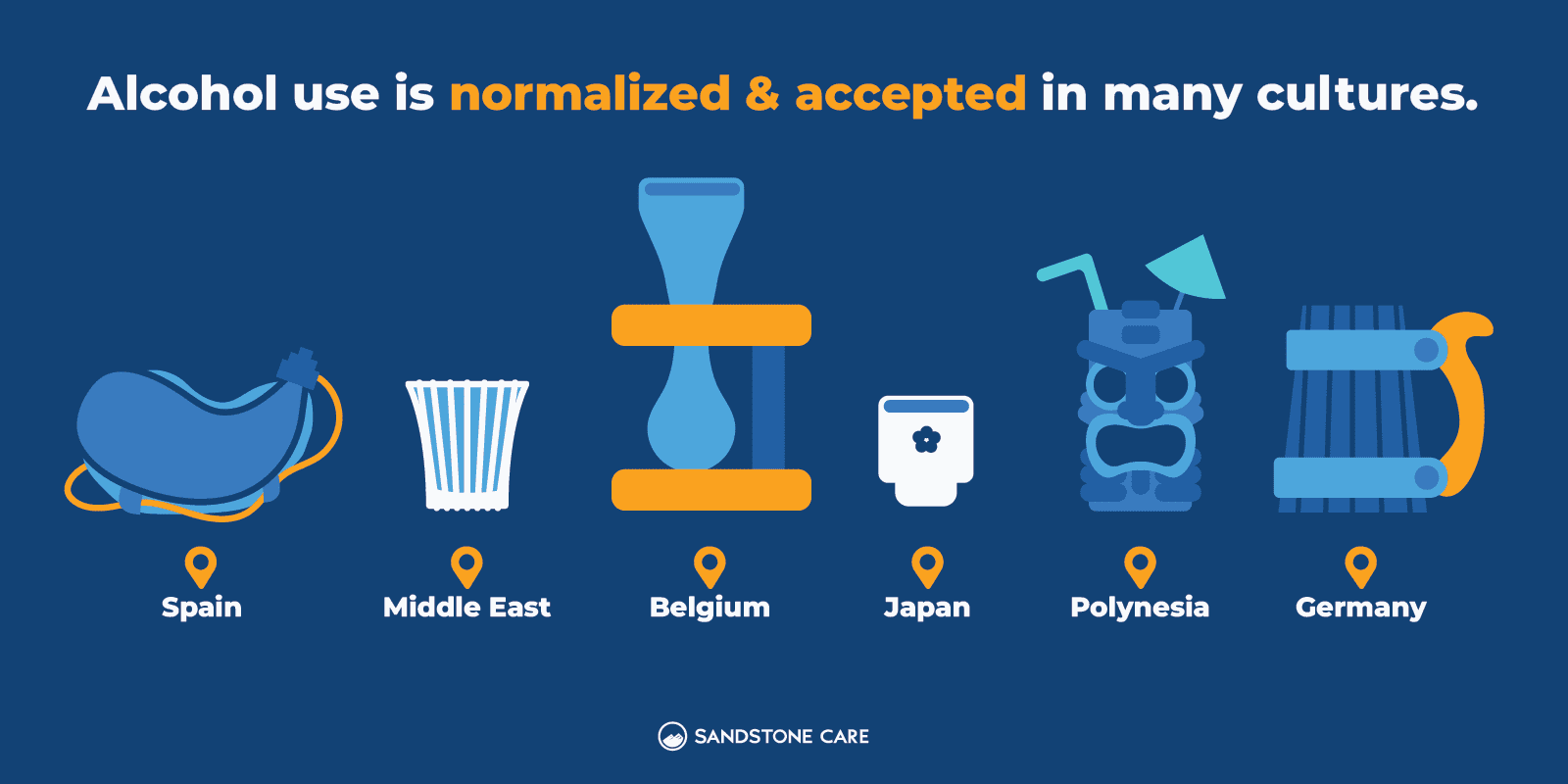
What Is Alcohol?
Alcohol is a drug that slows down brain activity, also known as a depressant.
Drinking alcohol can have effects on a person’s mood, behavior, self-control, memory, thinking, coordination, and much more.
What Are the Types of Alcohol?
In the United States, standard drinks are defined as drinks that contain approximately 0.6 fluid ounces or 14 grams of pure alcohol.
Different types of alcohol can include:
- Beer (about 5% alcohol)
- Malt liquor or flavored malt beverages, like hard seltzers (about 7% alcohol)
- Table wine (about 12% alcohol)
- Fortified wine (about 17% alcohol)
- Cordial, liqueur, or aperitif (about 24% alcohol)
- Brandy or cognac (about 40% alcohol)
- Distilled spirits such as gin, rum, tequila, vodka, or whiskey (about 40% alcohol)
How Does Alcohol Work?
Alcohol mainly targets the brain’s nerve cells and affects communication with nerve cells and other cells.
Alcohol affects how the brain looks and works and impact a person’s mental, physical, and behavioral health.
What Is the Cultural and Social Significance Of Alcohol?
Among many different cultures, alcohol has had a significant impact on the lives of individuals and societies.
Throughout history, it has been used in rituals, as a part of celebrations, and in many other social settings.
Many cultures associate drinking with festivity and pleasure.
Alcohol consumption in moderation has become normalized. However, activities such as binge drinking can cause serious side effects such as brain damage. It is important to understand the risk factors of alcohol use.
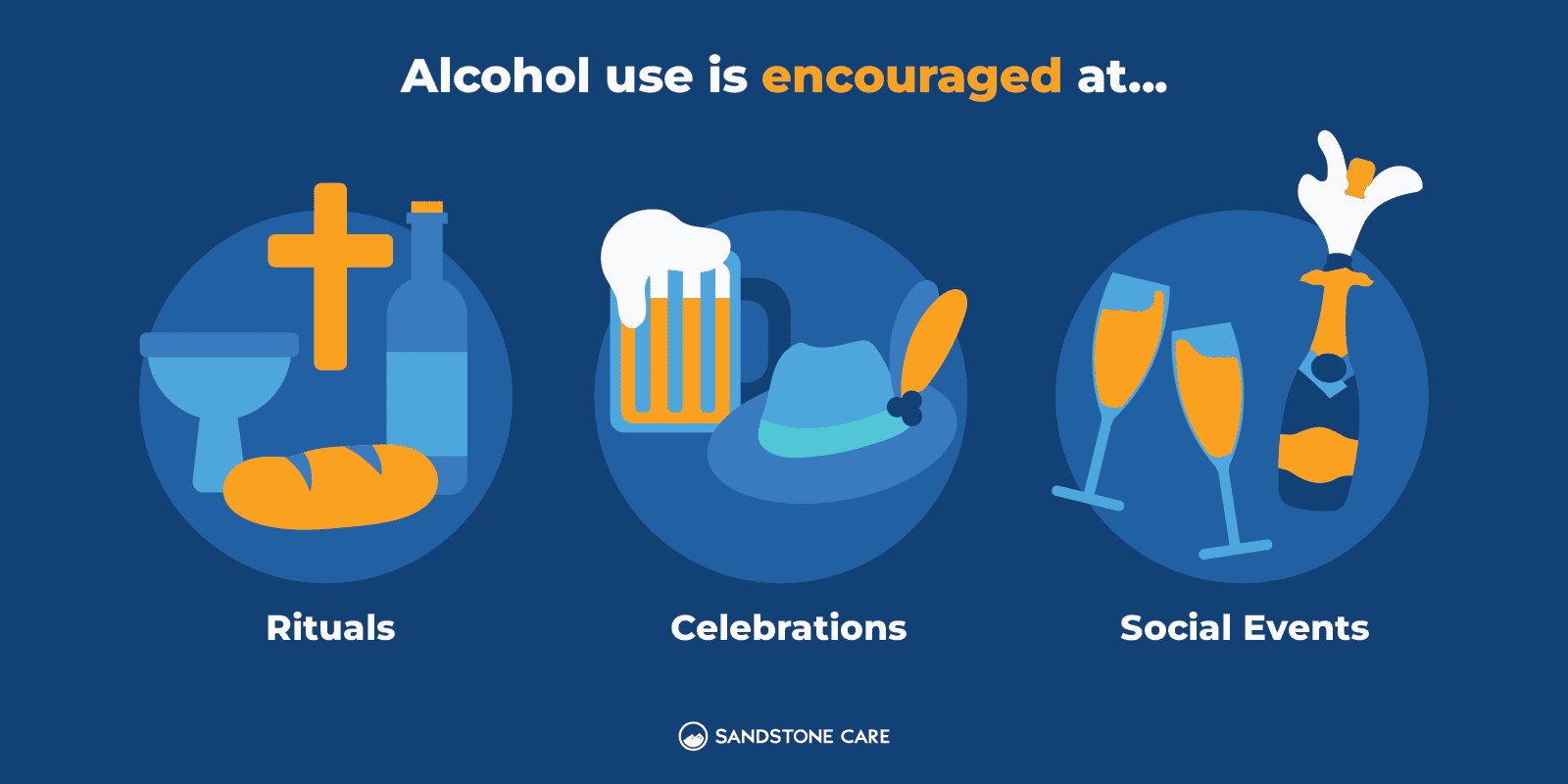
History of Drugs
Drug use has been used medicinally throughout history.
However, the emergence of more drugs and increased accessibility has led to harmful effects, abuse, and addiction.
Drug abuse and addiction have become global public health problems, especially among adolescents.
What Are the Categories of Drugs?
Drugs can fall into many different categories, including:
- Central nervous system (CNS) depressants
- CNS stimulants
- Hallucinogens
- Dissociative anesthetics
- Narcotic analgesics
- Inhalants
- Marijuana
What Is the Difference Between Legal and Illegal Drugs?
Illegal or illicit drugs are drugs that cannot be legally made, bought, sold, or used in the United States.
Commonly known illegal drugs can include opioids, cocaine, or heroin.
Legal drugs are medications that can be prescribed by a doctor or available over-the-counter.
Alcohol, caffeine, and nicotine can all be examples of legal drugs.
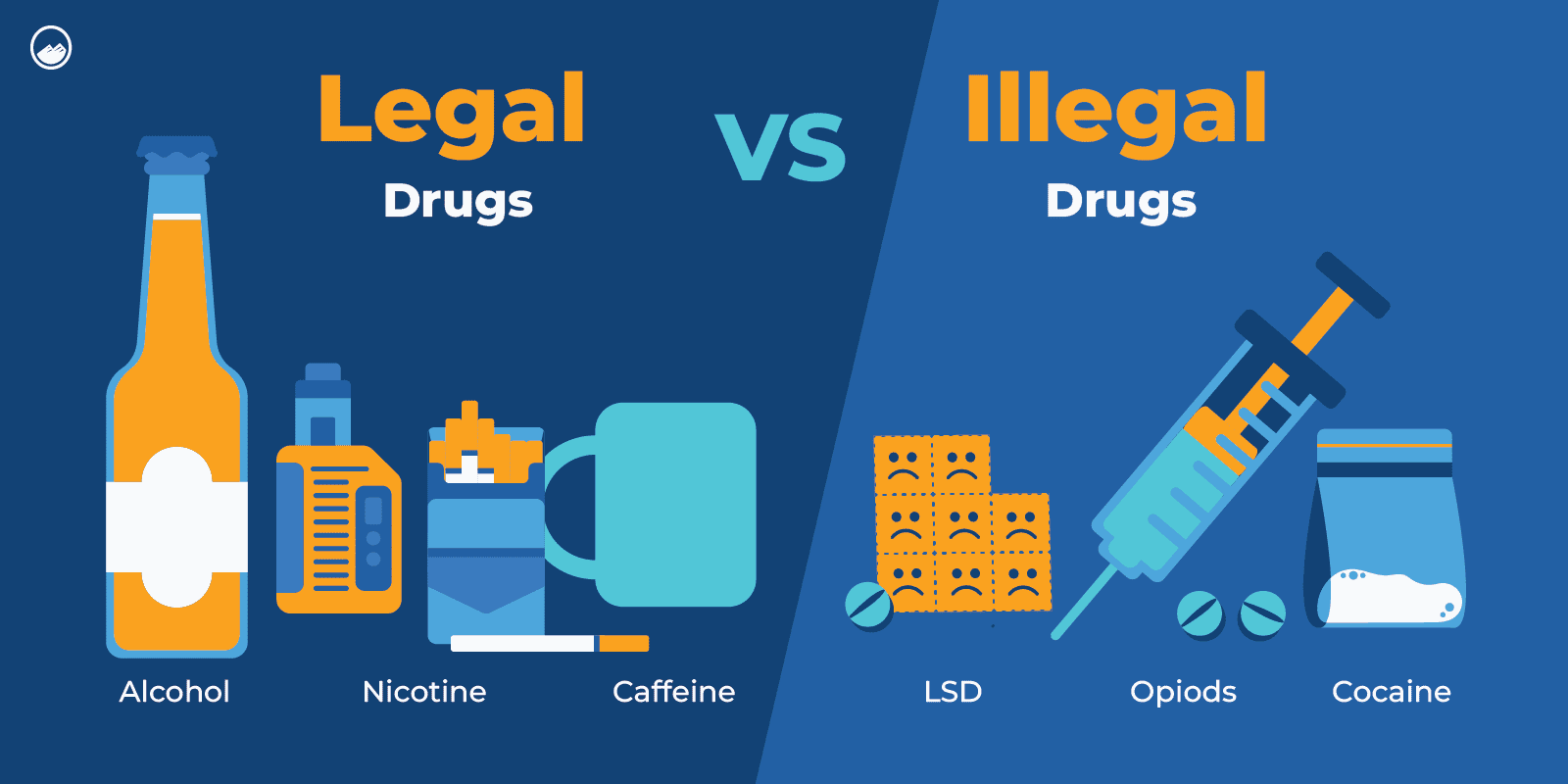
The Science Behind Alcohol
How Does Drinking Affect the Body?
Alcohol can affect each person differently depending on a variety of different factors, including:
- How much you drink
- Time it takes you to drink
- Whether or not you ate before drinking
- Age
- Sex
- Your physical condition
- Family history of alcohol problems
Alcohol use can lead to numerous effects on a person’s body, harming their physical and mental health.
It works by slowing down brain activity and can impact many major organs of the body. Alcohol use can impact the users heart rate and increase the risks of certain types of cancer.
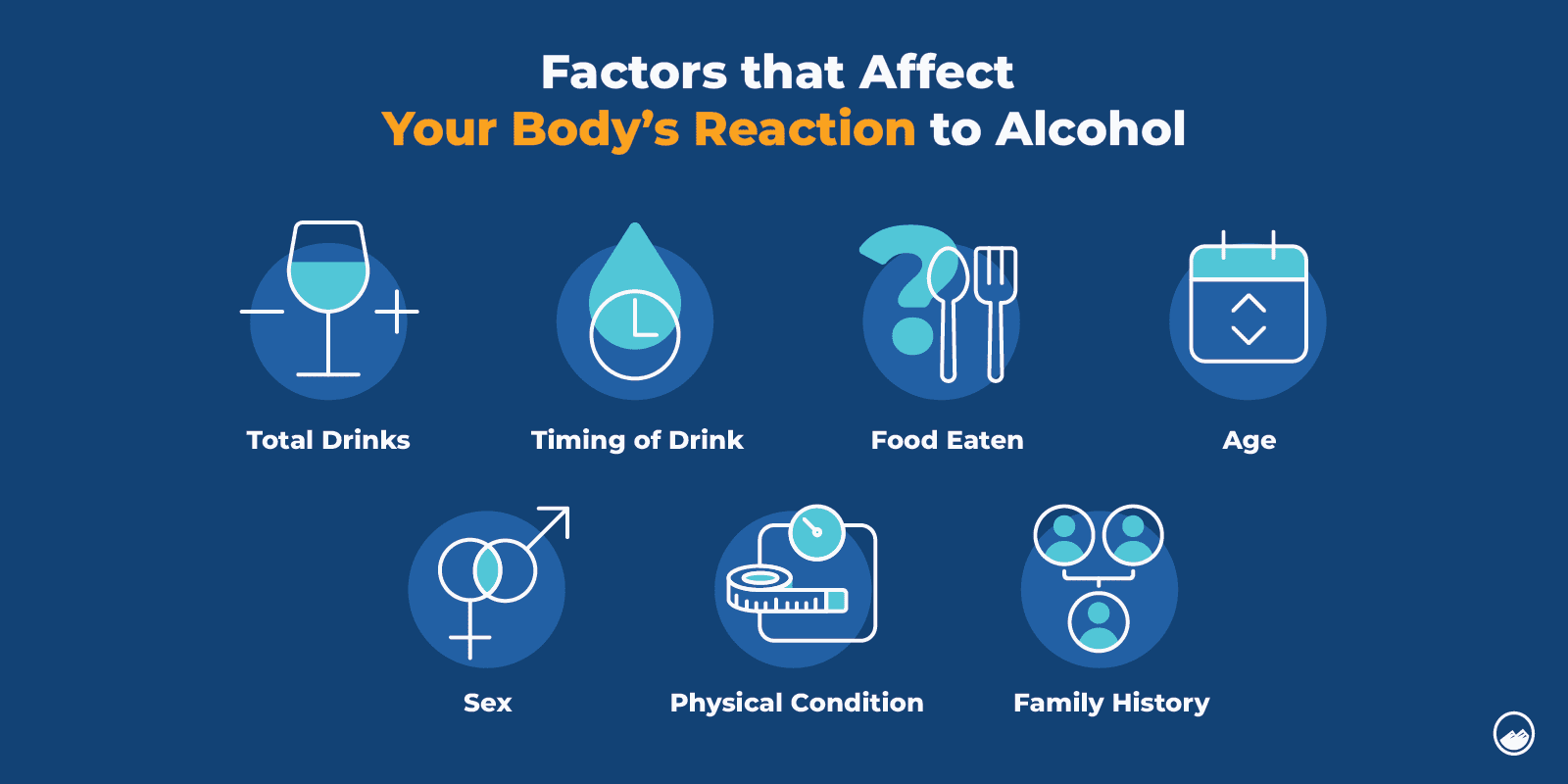
What Are The Short-Term Effects Of Alcohol?
Some short-term effects of alcohol can include:
- Slurred speech
- Drowsiness
- Poor vision
- Nausea and vomiting
- Loss of coordination or consciousness
What Are The Long-term Effects Of Alcohol?
Some long-term effects of alcohol can include:
- High blood pressure
- Heart problems like heart disease or stroke
- Liver disease
- Cancer
- Weakening of the immune system
- Learning and memory problems
- Mental health problems, like anxiety or depression
- Problems at work, school, or in personal relationships
- Alcohol dependence or alcohol use disorder
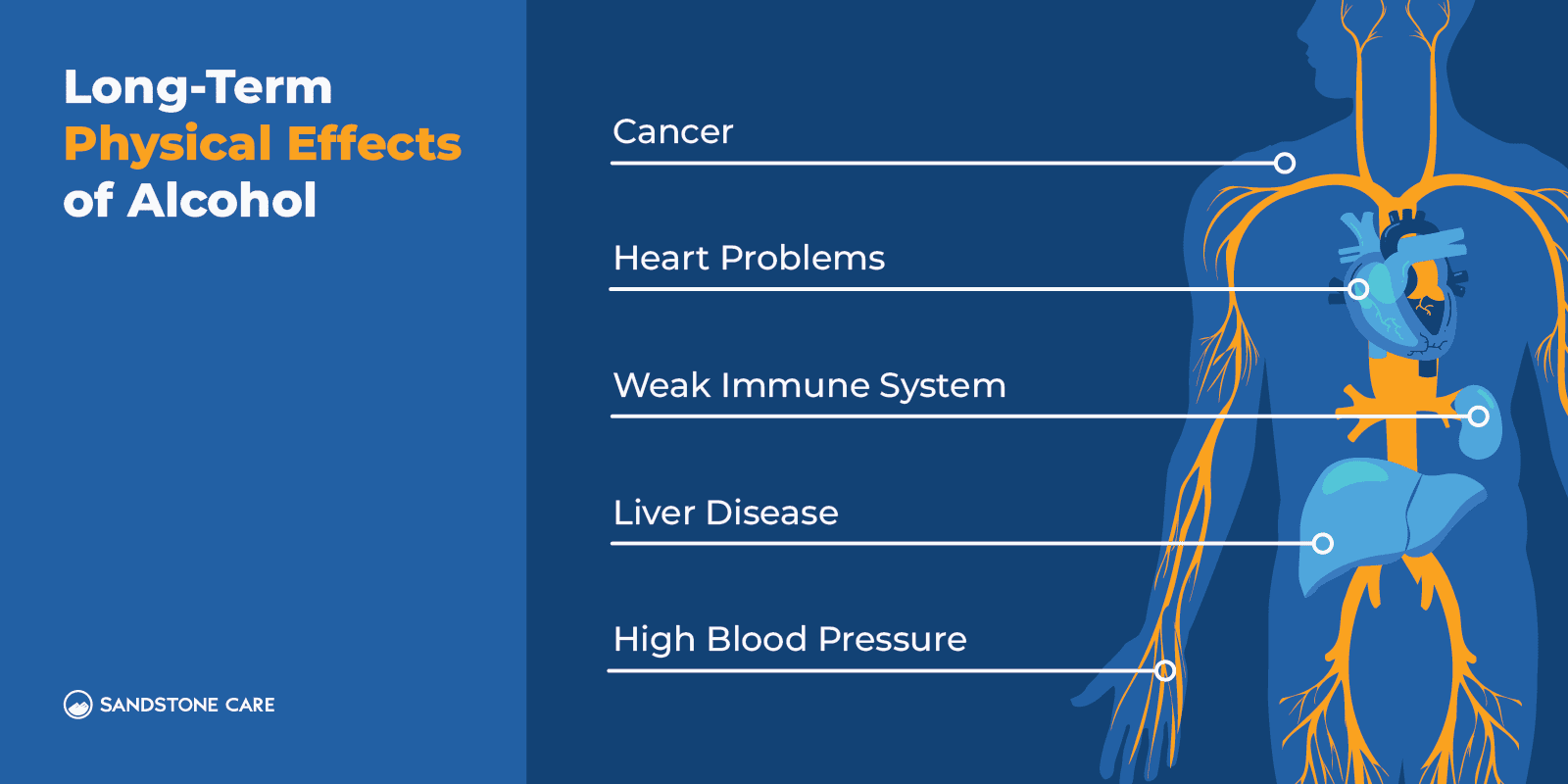
What Is Alcohol Tolerance?
According to the National Institute on Alcohol Abuse and Alcoholism, tolerance means that after a person continues to drink over a period of time, the same amount of alcohol begins to produce a lesser effect, causing the person to drink more and more to produce the same effects.
How Does Increased Alcohol Tolerance Affect a Person?
Tolerance of alcohol can affect a person’s drinking behaviors and the consequences of drinking.
It can cause a person to engage in heavy drinking and unhealthy behaviors. Alcohol use can also lead to negative health outcomes, including organ damage.
Tolerance may also impact how a person performs everyday tasks, can cause interactions with other drugs or medications, and can increase the risk for alcoholism.
Alcohol tolerance can then develop into alcohol dependence.
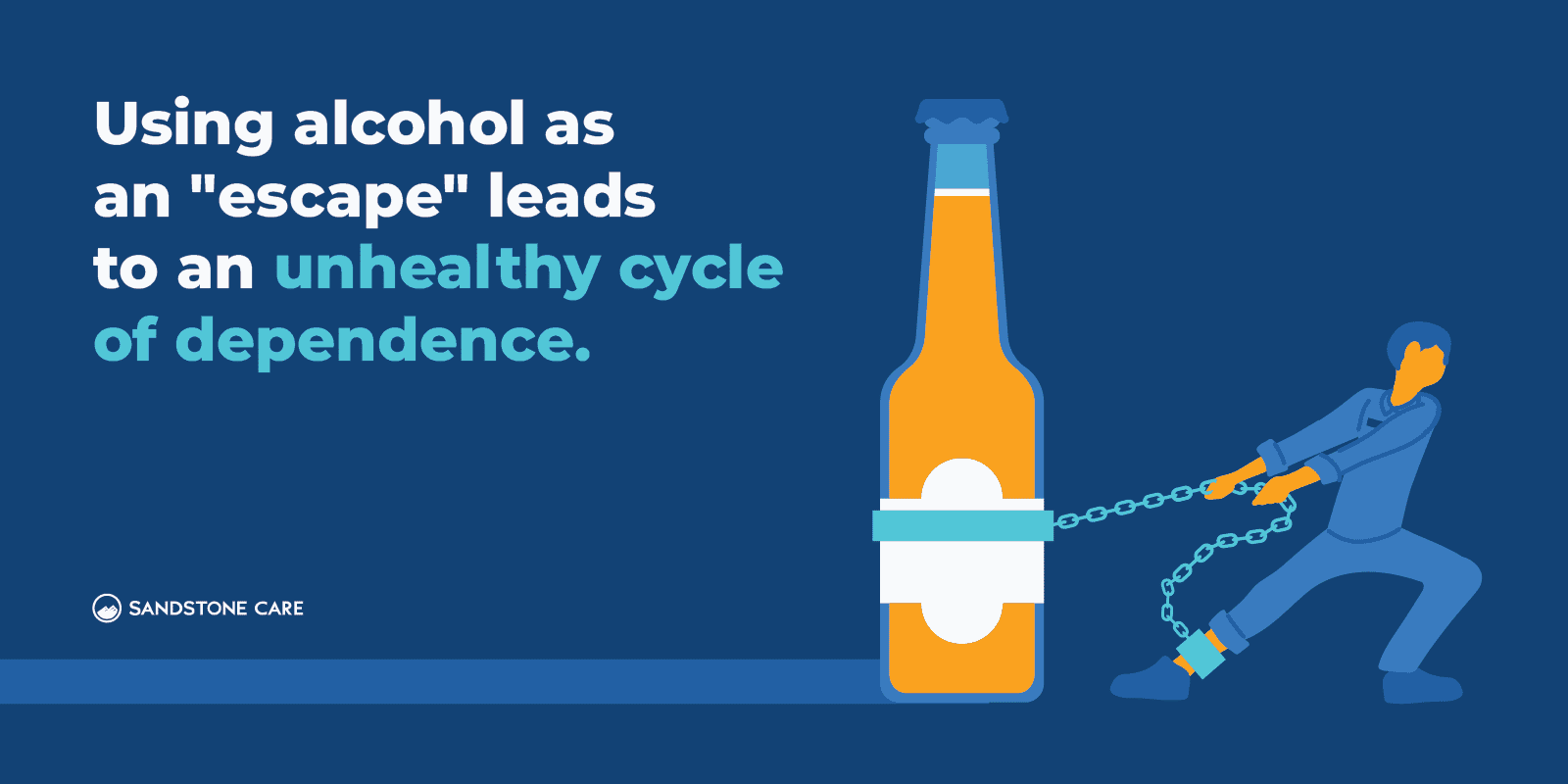
What Is Alcohol Dependence?
Alcohol dependence is a chronic condition that involves cravings for alcohol and an inability to control one’s alcohol consumption.
Those who experience alcohol dependence will likely benefit from the added support of addiction treatment programs. Family and friends will sometimes host conversations called “interventions” to express their concerns and desires for the user to become sober.
Is Alcohol a Drug?
Yes, alcohol is a drug, specifically a central nervous system depressant.
According to MedlinePlus, “drugs are chemical substances that can change how your body and mind work.”
Is Alcohol Classified As a Drug?
According to the National Institutes of Health, in the context of abuse, “drug” refers to any substance that alters consciousness and may be habit-forming.
From this definition, the classification as a drug for alcohol falls under the context of abuse because it can alter a person’s consciousness and be habit-forming.
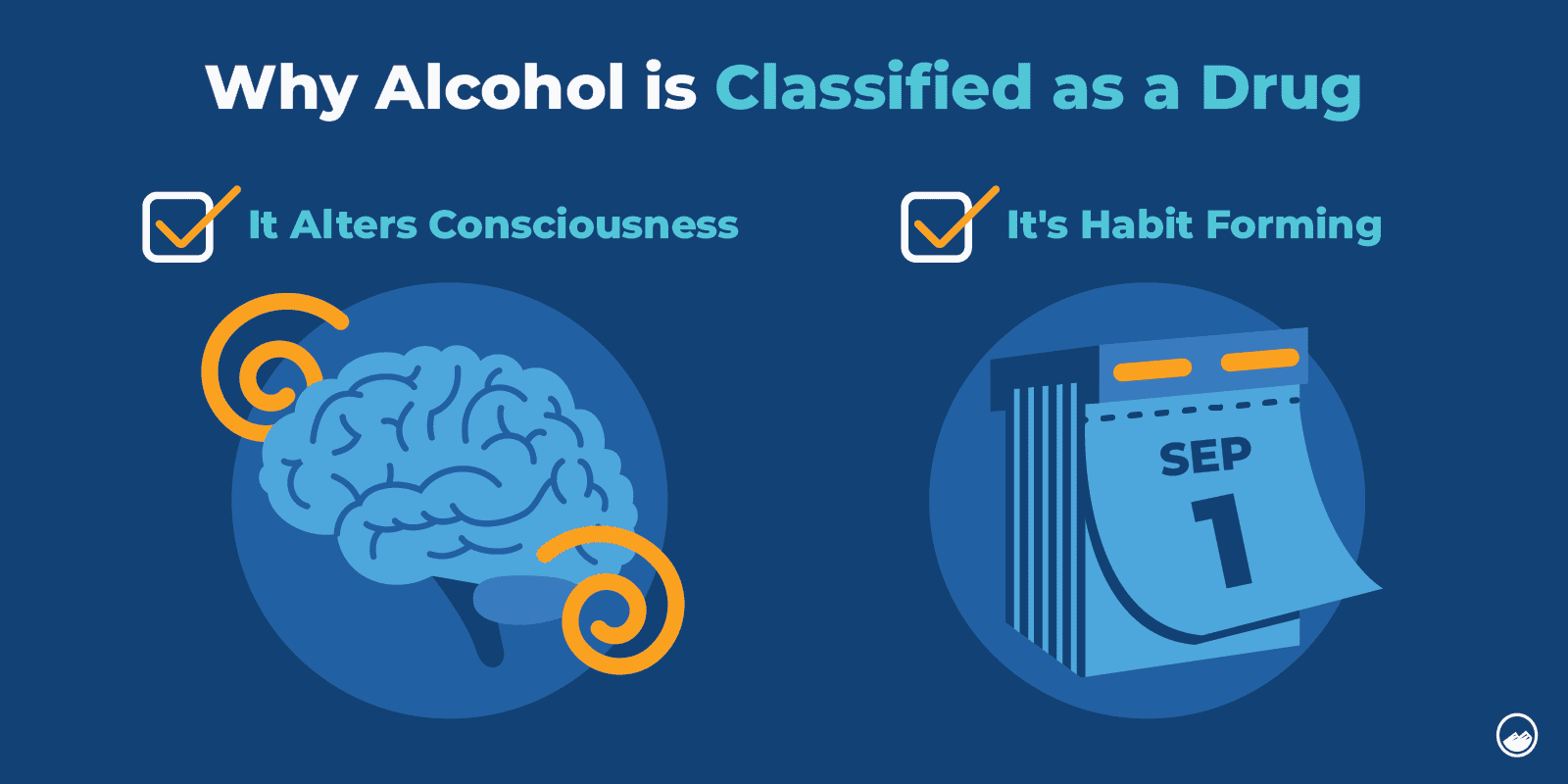
What Kind Of Drug Is Alcohol Classified As?
Alcohol is classified as a central nervous system depressant.
Why Is Alcohol Addictive?
The National Institute of Alcohol Abuse and Alcoholism (NIAAA) defines alcohol addiction as “a chronic relapsing disorder associated with compulsive alcohol drinking, the loss of control over intake, and the emergence of a negative emotional state when alcohol is no longer available.”
Alcohol, like many other substances, can cause effects on the brain, making a person feel pleasure while also blocking out negative feelings temporarily.
The feelings that alcohol triggers can make a person continuously seek out alcohol repeatedly to achieve those same effects.
As a person consumes alcohol over time, it can cause changes in the structure and function of the brain. These changes can contribute to an unhealthy cycle of alcohol consumption that can lead to alcohol dependence, alcohol use disorder, or alcohol addiction.
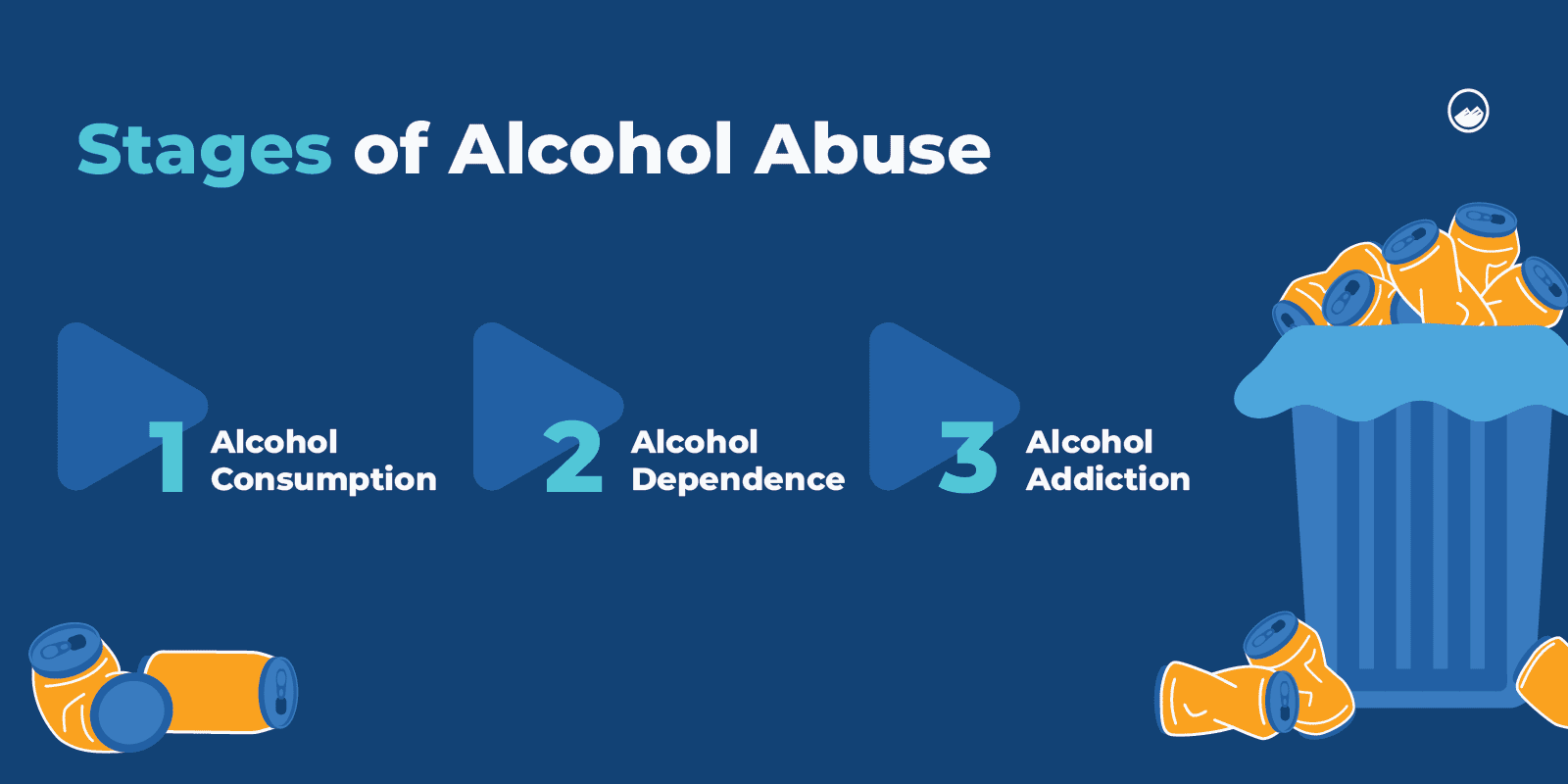
Can You Have a Psychological Dependence on Alcohol?
According to Alcohol Research & Health, excessive alcohol use over time can lead to the development of an alcohol dependence associated with both physical and psychological withdrawal symptoms.
Can You Have a Physical Dependence on Alcohol?
A person can develop a physical dependence on alcohol if they continue to use an excessive amount of alcohol over time.
When a person develops a physical alcohol dependence, they will experience withdrawal symptoms when alcohol use stops or suddenly decreases.
What Are the Side Effects of Alcohol Withdrawal?
Common side effects of alcohol withdrawal can include:
- Rapid heartbeat
- Increased blood pressure
- Excessive sweating
- Shaking
- Irritability and agitation
- Anxiety
- Sleep disturbances
- Aches
In more severe cases, alcohol withdrawal can also cause effects of motor seizures, hallucinations, or delirium.
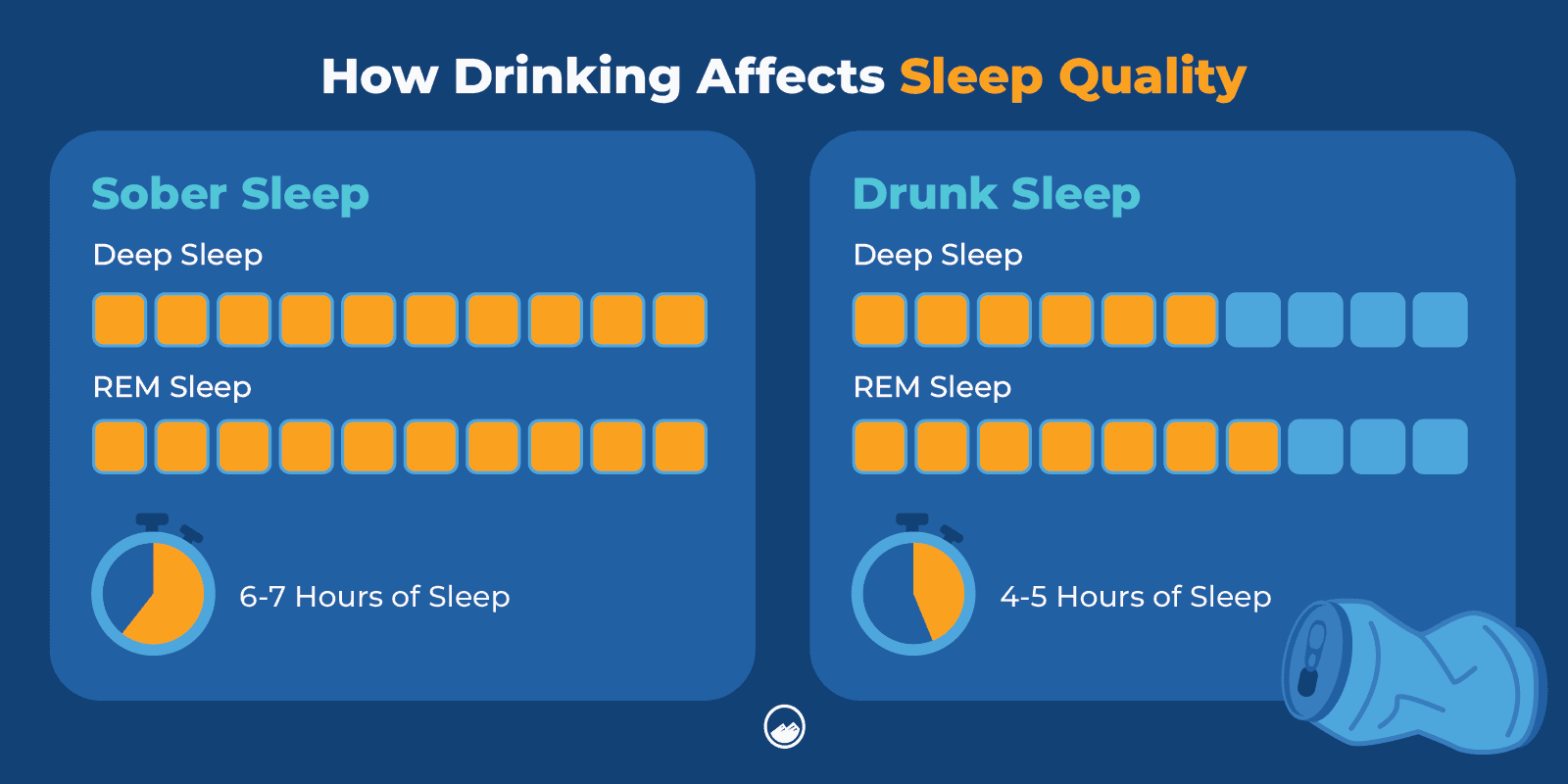
The Societal View of Alcohol as a Drug
What Is the Public Perception of Alcohol Versus Drugs?
Because alcohol use has become so normalized in the United States, the public perception has viewed alcohol as less harmful than other drugs.
Many people don’t even recognize that alcohol is a drug.
Multiple factors contribute to this perception of alcohol as a less harmful drug, including its accessibility and promotion in television, movies, and social media.
However, the negative effects of alcohol can be just as serious as other drugs and, in some cases, life-threatening.
What Are 3 Social Effects of Drinking?
Consuming alcohol can affect the way a person behaves, interacts, and their relationships.
Alcohol use can cause negative social effects, including:
- Lowered inhibitions
This means a person may do things that they usually wouldn’t because they cannot think clearly. This can put a person in a vulnerable and dangerous place. - Aggression
Some people exhibit aggressive behavior and can become violent towards themselves or others. - Isolation
Continued alcohol use can lead to negative feelings such as a depressed mood, anxiety, guilt, shame, frustration, fear, or hopelessness. These feelings can often cause a person to isolate themselves or withdraw from others, even loved ones.
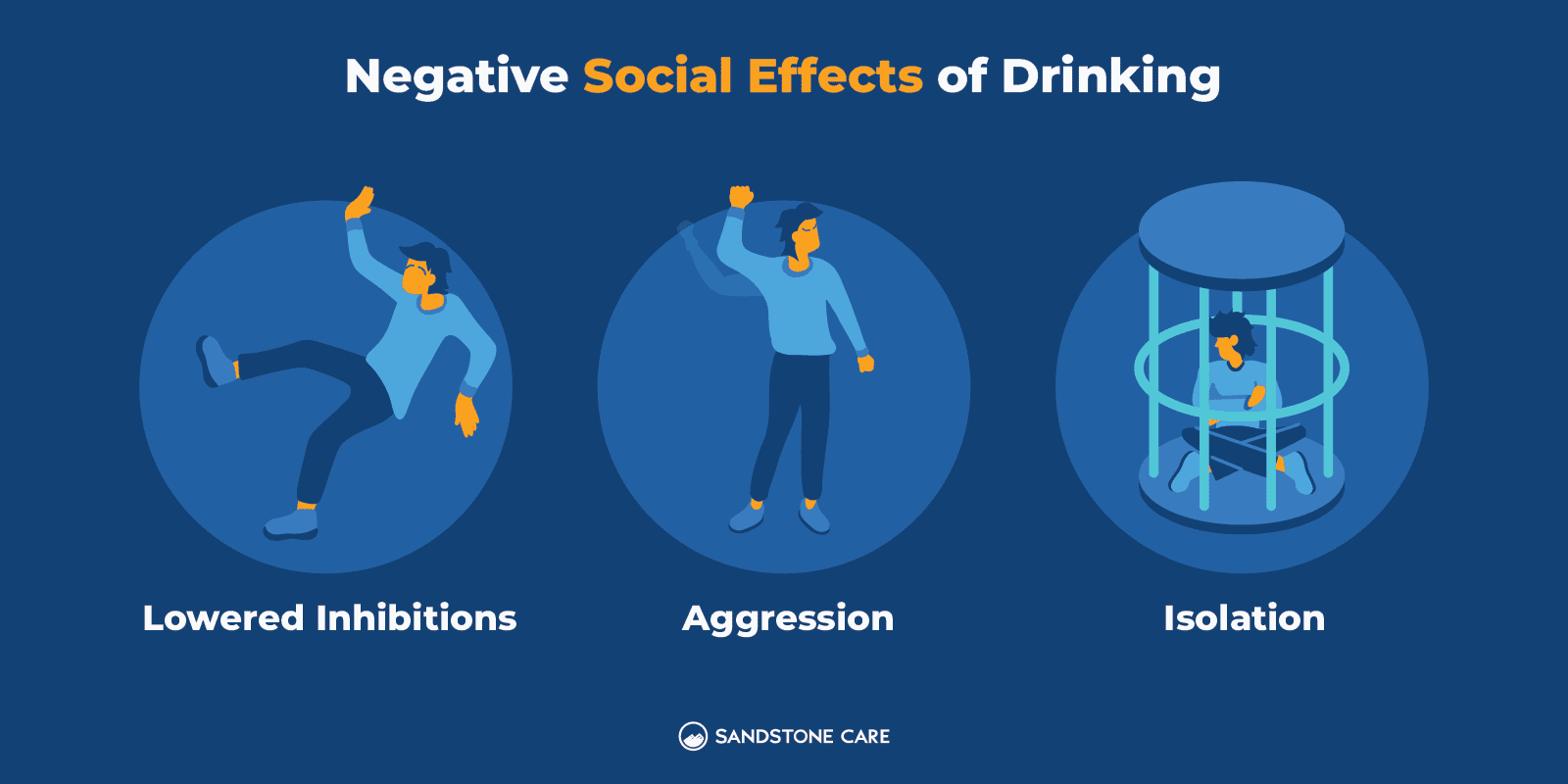
What Are the Influences of Cultural Norms and Laws on Alcohol Use?
Since alcohol use has been so normalized, specifically in the United States, many people, including young people, don’t acknowledge the harmful effects of alcohol and begin drinking at young ages.
Many people drink in moderation, yet alcohol is one of the most commonly abused drugs in the United States.
Laws about alcohol use can help keep young people from obtaining and consuming alcohol and focus on safety measures and keeping drunk drivers off the road.
What Is the Role of Media and Advertising in Shaping Attitudes Towards Drinking?
It is not uncommon to see pro-alcohol use content in media and advertising.
These messages and images that promote the use of alcohol can become very problematic, especially for teens and young adults.
According to Alcohol Research: Current Reviews, online displays of alcohol behavior have been associated with “offline alcohol behavior and risky drinking.”
When alcohol use is marketed and promoted in media and advertising, it can make a person feel that they need to drink to be cool or to fit in.
Moreover, the advertising of alcohol also fails to address the serious effects of alcohol use. It glamorizes alcohol, only associating it with a “good time” or as a way to “get away” from reality.
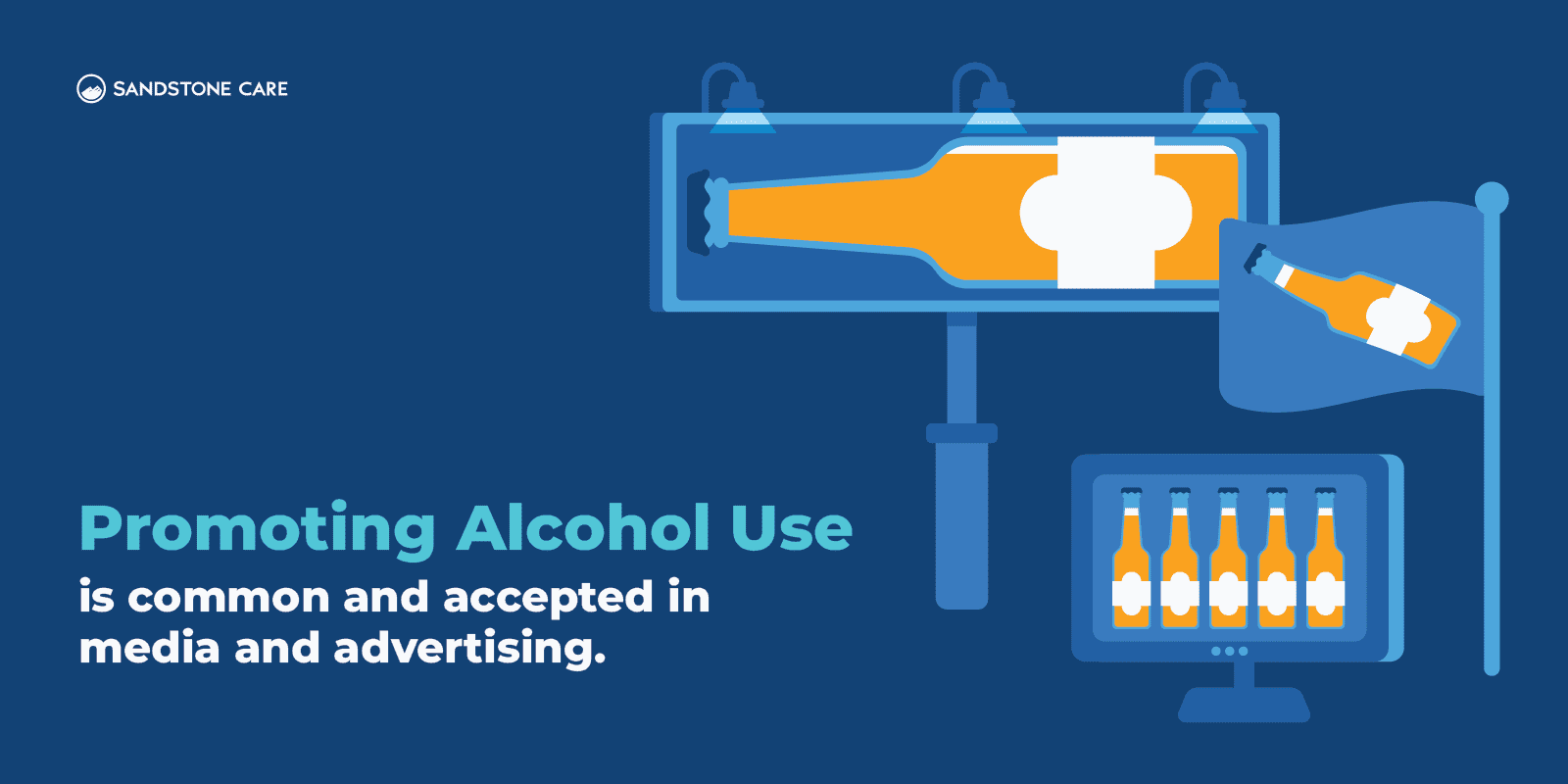
Health Risks of Alcohol
What Are Some Alcohol-related Diseases And Conditions?
According to the Substance Abuse and Mental Health Services Administration (SAMHSA), “Excessive alcohol use can increase a person’s risk of stroke, liver cirrhosis, alcoholic hepatitis, cancer, and other serious health conditions.”
Other alcohol-related diseases and conditions can include:
- High blood pressure
- Heart disease
- Cancer
- Weakened immune system
- Learning and memory problems
- Tolerance and dependence
- Alcohol use disorder
- Addiction
What Impact Does Alcohol Have on Mental Health?
Some people turn to alcohol to cope or self-medicate for difficult or unaddressed feelings and conditions.
Alcohol use can become an unhealthy coping mechanism when a person uses alcohol to escape or “forget” about their problems. This behavior only results in an unhealthy cycle that leads to more problems over time.
Alcohol can take a toll on your mental health and cause signs and symptoms of:
- Depression
- Anxiety
- Psychosis
- Antisocial behavior
The chemical changes triggered by alcohol use in the brain can cause a person to experience negative feelings, such as anger, sadness, or loneliness.
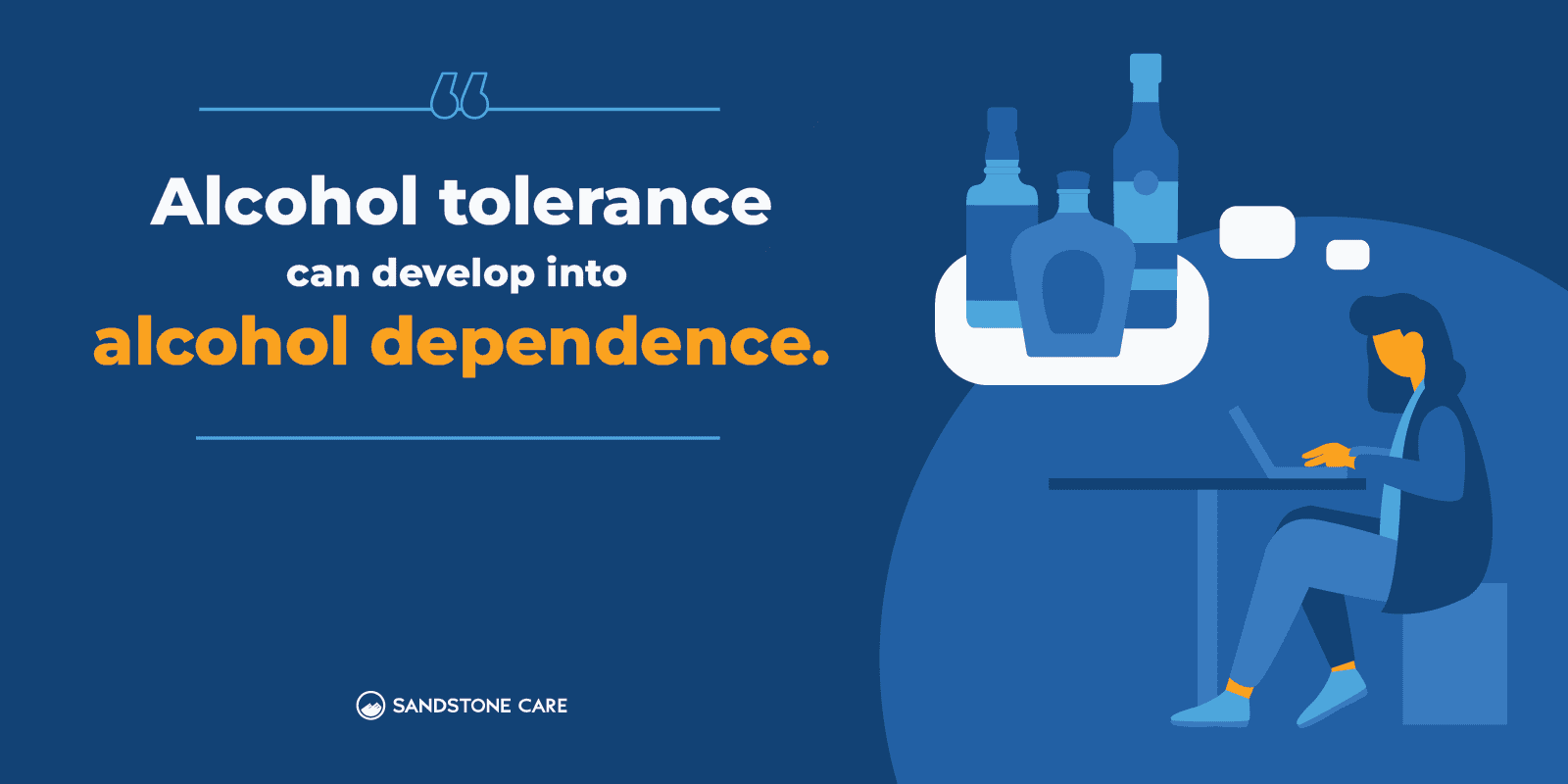
How Can Drinking Lead To Accidents?
Alcohol use can lead to many different types of accidents and injuries.
Even in moderation, alcohol can impair a person’s balance, focus, reaction time, judgment, and behaviors.
These effects can put a person in harm’s way, even if they think they are fine.
What Accidents and Injuries Are Associated with Alcohol Use?
Some of the most common accidents and injuries associated with alcohol use can include:
- Road injuries
- Drowning
- Poisoning
- Falls
- Burns
- Suicide
- Homicide
If you or a loved one are experiencing suicidal thoughts, call the National Suicide Prevention Lifeline at 988 or call 911.
Alcohol Dependence Treatment
What Are Four Signs that a Person May Have a Problem with Alcohol Use?
Four of the more common signs that a person may have a problem with alcohol use can include:
- Being unable to stop or quit drinking to the point where it seems they can’t control it
- Spending a lot of time and money on drinking or recovering from alcohol use
- Continuing to drink, even if it is causing problems at work, school, in relationships, or in their personal life
- Developing a tolerance and needing more and more alcohol to produce the same desired effects
What Are Treatment Options For Alcohol Dependence?
There are a variety of different treatment options available for individuals who are facing challenges with alcohol use or alcoholism.
Some of the common treatments for alcohol dependence can include:
- Medically-supervised detox
Detox involves ridding the body of a drug and managing withdrawal symptoms in a safe and controlled environment. - Psychotherapy
Psychotherapy, also known as talk therapy, can be helpful for many different people who may be facing challenges with alcohol use, substance use, or mental health disorders.Cognitive behavioral therapy (CBT) is a commonly used form of psychotherapy that focuses on identifying unhealthy thought or behavior patterns and learning healthy ways to cope with or change these cycles.
- Medication
Sometimes, a healthcare provider may prescribe medication in combination with psychotherapy as a treatment approach for alcohol addiction or dependence. - Support groups
Support groups, such as Alcoholics Anonymous, can be help build a strong support network where alcohol drinkers can relate to others who have gone through similar challenges.With support groups, each individual can learn from one another and find support in knowing they are not alone while also promoting accountability.
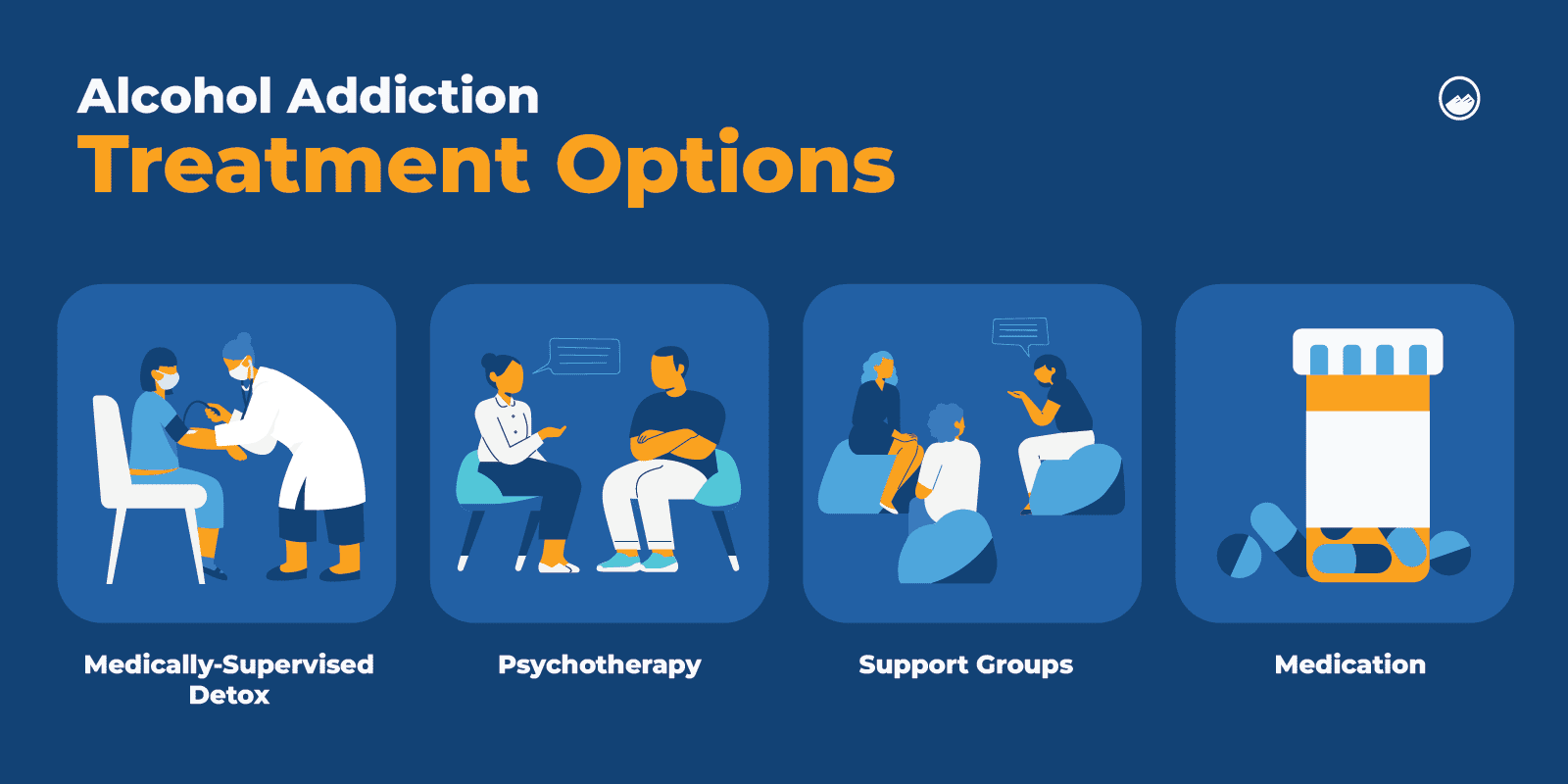
Why Is Social Support Important on Rehabilitation?
The people around you can greatly impact your life.
Being in an environment where alcohol use is encouraged can make the healing process more difficult and may increase a person’s risk for relapse.
Surrounding yourself with supportive people, whether friends, peers, community members, or anyone else, is important in building a support system that is there for you through the highs and lows of rehabilitation.
FAQ
You Have Questions. We Have Answers.
Our goal is to provide the most helpful information. Please reach out to us if you have any additional questions. We are here to help in any way we can.
Alcohol is both a drug and a depressant.
Depressants are drugs that can induce sleep and can, relieve anxiety and muscle spasms, and prevent seizures, according to the NIH and the Drug Enforcement Administration.
Alcohol is classified as a central nervous system depressant.
Many people don’t realize that alcohol is a toxic chemical.
Alcohol consumption, whether it is once in a while or frequently, can cause harm to the body and requires the liver to filter it out of the blood.
Some people refer to all drugs as narcotics and define them as substances that help to treat moderate or severe pain.
However, the DEA defines narcotics as “opium, opium derivatives, and their semi-synthetic substitutes.”
According to this definition, alcohol wouldn’t be classified as a narcotic.
Alcohol is made through the fermentation of grains, fruits, or vegetables.
This results in a chemical reaction that produces ethanol and carbon dioxide.
Ethanol, or ethyl alcohol, is an organic compound that is a colorless, flammable, and volatile liquid.
Gateway drugs are substances that increase a person’s risk of trying other substances.
Alcohol can be considered a gateway drug because it can lead to the use of other serious and harmful substances.
Alcohol is not considered a scheduled controlled substance, even though marijuana is.
Although alcohol is regulated by the federal government in its production, distribution, and sales.


Let’s take the next steps together
Alcohol is a drug that can produce serious, harmful effects. Excessive alcohol consumption can lead to dependence, alcohol use disorder, and addiction. Sandstone Care is here to support teens and young adults with mental health and substance use disorders. Call (888) 850-1890.

